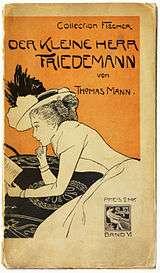Little Herr Friedemann

"Little Herr Friedemann" (orig. German Der kleine Herr Friedemann) is a short story by Thomas Mann. Initially appeared in 1896 in Die neue Rundschau. Appeared in 1898 in an anthology of Mann's short stories entitled collectively as Der kleine Herr Friedemann.
Plot
Johannes Friedemann was dropped on his head as at birth. "It was the nurse's fault", the story begins. The nurse had been unable to overcome the effects of her daily glass of red wine, stout and methylated spirits intended for the spirit lamp.
He grows up deformed and hunchbacked. He falls in love as a young boy with a girl, only to find her kissing another behind a hedge. He then swears off love dedicating himself to self-improvement.
He grows into a man who has taste in music, clothes, and literature. He is successful in his career and seemingly content. A military commander with a personable wife is stationed in Herr Friedemann's town. Frau Commandant von Rinnlingen destroys Herr Friedemann's content. He falls in love with her on sight, despite her lack of classic beauty.
Herr Friedemannn and Frau von Rinnglingen make a deep connection, despite the brevity of their encounters and the constraints of society. Herr Friedemann confesses to Frau von Rinnglingen that, after meeting her, he has realized his life thus far has been a lie; he was only imagining happiness, but was not happy.
She tells him this was brave and admits to knowing similar sadness. He confesses his love to her; she pauses, then breaks away from him laughing. Friedemann drowns himself in a lake.
Some characters and locations of the story reappear in changed contexts in Mann's novel Buddenbrooks. The theme of the story is recast with a very different leading character and a less dramatic conclusion in Mann's short story "The Dilettante".